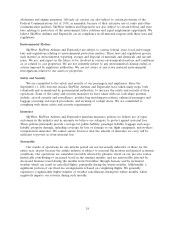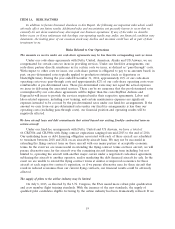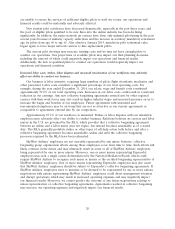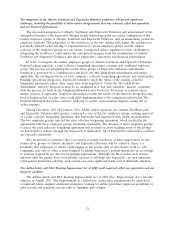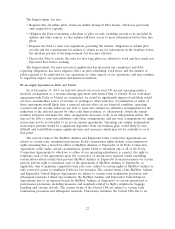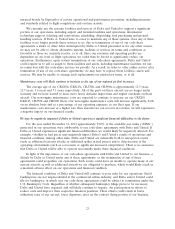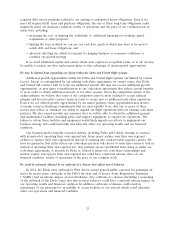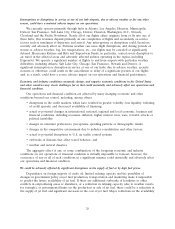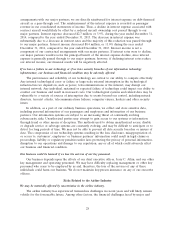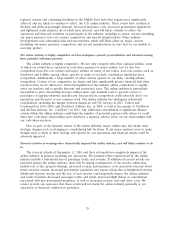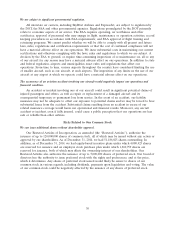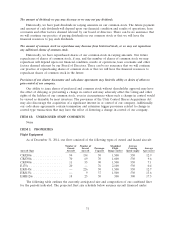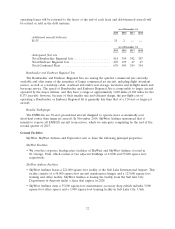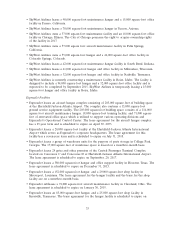SkyWest Airlines 2014 Annual Report Download - page 31
Download and view the complete annual report
Please find page 31 of the 2014 SkyWest Airlines annual report below. You can navigate through the pages in the report by either clicking on the pages listed below, or by using the keyword search tool below to find specific information within the annual report.Interruptions or disruptions in service at one of our hub airports, due to adverse weather or for any other
reason, could have a material adverse impact on our operations.
We currently operate primarily through hubs in Atlanta, Los Angeles, Houston, Minneapolis,
Detroit, San Francisco, Salt Lake City, Chicago, Denver, Houston, Washington, D.C., Newark,
Cleveland and the Pacific Northwest. Nearly all of our flights either originate from or fly into one of
these hubs. Our revenues depend primarily on our completion of flights and secondarily on service
factors such as timeliness of departure and arrival. Any interruptions or disruptions could, therefore,
severely and adversely affect us. Extreme weather can cause flight disruptions, and, during periods of
storms or adverse weather, fog, low temperatures, etc., our flights may be canceled or significantly
delayed. Hurricanes Katrina and Rita and Superstorm Sandy, in particular, caused severe disruption to
air travel in the affected areas and adversely affected airlines operating in the region, including
ExpressJet. We operate a significant number of flights to and from airports with particular weather
difficulties, including Atlanta, Salt Lake City, Chicago, San Francisco, Newark and Denver. A
significant interruption or disruption in service at one of our hubs, due to adverse weather, security
closures or otherwise, could result in the cancellation or delay of a significant portion of our flights
and, as a result, could have a severe adverse impact on our operations and financial performance.
Economic and industry conditions constantly change, and negative economic conditions in the United States
and other countries may create challenges for us that could materially and adversely affect our operations and
financial condition.
Our operations and financial condition are affected by many changing economic and other
conditions beyond our control, including, among others:
• disruptions in the credit markets, which have resulted in greater volatility, less liquidity, widening
of credit spreads, and decreased availability of financing;
• actual or potential changes in international, national, regional and local economic, business and
financial conditions, including recession, inflation, higher interest rates, wars, terrorist attacks or
political instability;
• changes in consumer preferences, perceptions, spending patterns or demographic trends;
• changes in the competitive environment due to industry consolidation and other factors;
• actual or potential disruptions to U.S. air traffic control systems;
• outbreaks of diseases that affect travel behavior; and
• weather and natural disasters.
The aggregate effect of any, or some combination, of the foregoing economic and industry
conditions on our operations or financial condition is virtually impossible to forecast; however, the
occurrence of any or all of such conditions in a significant manner could materially and adversely affect
our operations and financial condition.
We could be adversely affected by significant disruptions in the supply of fuel or by high fuel prices.
Dependence on foreign imports of crude oil, limited refining capacity and the possibility of
changes in government policy on jet fuel production, transportation and marketing make it impossible
to predict the future availability of jet fuel. If there are additional outbreaks of hostilities or other
conflicts in oil-producing areas or elsewhere, or a reduction in refining capacity (due to weather events,
for example), or governmental limits on the production or sale of jet fuel, there could be a reduction in
the supply of jet fuel and significant increases in the cost of jet fuel. Major reductions in the availability
26




